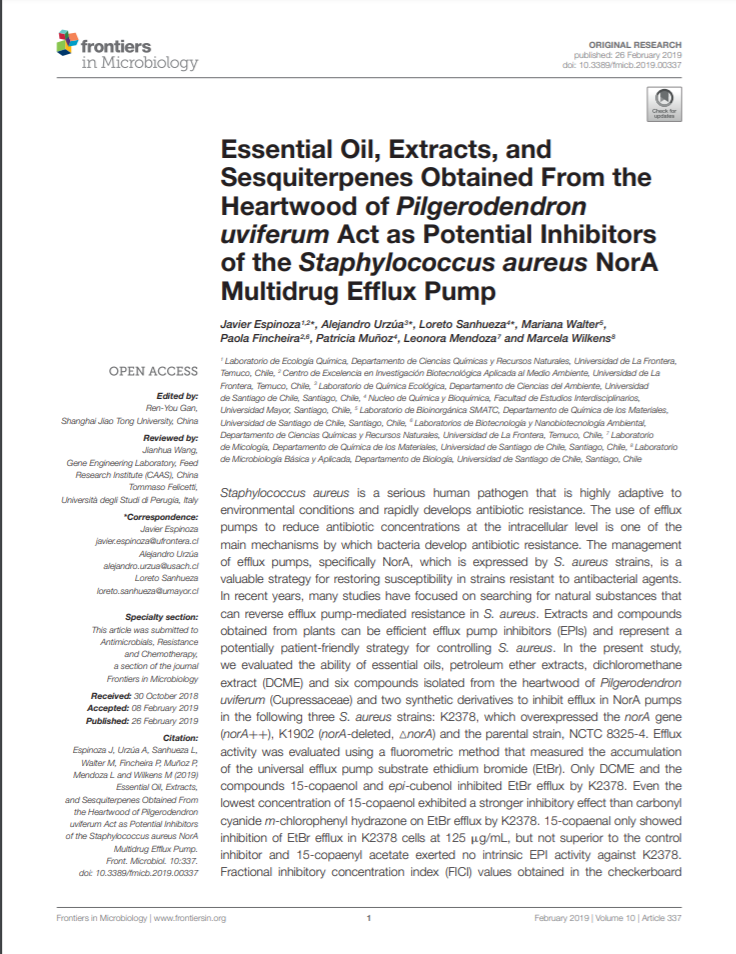Essential Oil, Extracts, and Sesquiterpenes Obtained From the Heartwood of Pilgerodendron uviferum Act as Potential Inhibitors of the Staphylococcus aureus NorA Multidrug Efflux Pump

Fecha
2019Autor
Sanhueza, Loreto; Muñoz, Patricia [Univ Mayor, Fac Estudios Interdisciplinarios, Nucleo Quim & Bioquim, Santiago, Chile]
Espinoza, Javier
Urzua, Alejandro
Walter, Mariana
Fincheira, Paola
Muñoz, Patricia
Mendoza, Leonora
Wilkens, Marcela
Ubicación geográfica
Notas
HERRAMIENTAS
Acceda a títulos restringidos
¿Cómo descargar?Resumen
Staphylococcus aureus is a serious human pathogen that is highly adaptive to environmental conditions and rapidly develops antibiotic resistance. The use of efflux pumps to reduce antibiotic concentrations at the intracellular level is one of the main mechanisms by which bacteria develop antibiotic resistance. The management of efflux pumps, specifically NorA, which is expressed by S. aureus strains, is a valuable strategy for restoring susceptibility in strains resistant to antibacterial agents. In recent years, many studies have focused on searching for natural substances that can reverse efflux pump-mediated resistance in S. aureus. Extracts and compounds obtained from plants can be efficient efflux pump inhibitors (EPIs) and represent a potentially patient-friendly strategy for controlling S. aureus. In the present study, we evaluated the ability of essential oils, petroleum ether extracts, dichloromethane extract (DCME) and six compounds isolated from the heartwood of Pilgerodendron uviferum (Cupressaceae) and two synthetic derivatives to inhibit efflux in NorA pumps in the following three S. aureus strains: K2378, which overexpressed the norA gene (norA++), K1902 (norA-deleted, Delta norA) and the parental strain, NCTC 8325-4. Efflux activity was evaluated using a fluorometric method that measured the accumulation of the universal efflux pump substrate ethidium bromide (EtBr). Only DCME and the compounds 15-copaenol and epi-cubenol inhibited EtBr efflux by K2378. Even the lowest concentration of 15-copaenol exhibited a stronger inhibitory effect than carbonyl cyanide m-chlorophenyl hydrazone on EtBr efflux by K2378. 15-copaenal only showed inhibition of EtBr efflux in K2378 cells at 125 mu g/mL, but not superior to the control inhibitor and 15-copaenyl acetate exerted no intrinsic EPI activity against K2378. Fractional inhibitory concentration index (FICI) values obtained in the checkerboard assays, indicated that all combinations between DCME, epi-cubenol and 15-copaenol, and tested antibiotics showed a synergistic effect in wild type, norA and Delta norA strains. Moreover, those were not toxic for the HeLa cell line at concentrations in which the synergistic effect and inhibitory activity of efflux pumps was determined. Other extracts and compounds obtained from P. uviferum did not display EtBr efflux-inhibiting activity against the evaluated S. aureus strains.
Coleccion/es a la/s que pertenece:
Si usted es autor(a) de este documento y NO desea que su publicación tenga acceso público en este repositorio, por favor complete el formulario aquí.